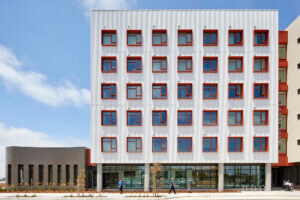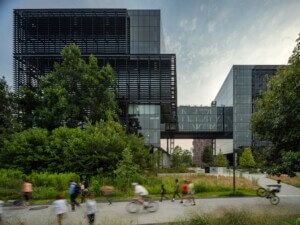Happy first Monday in May! Today’s action-packed roundup of news you can use tracks, among other things, a trifecta of major firm expansions and acquisitions.
Let’s dive right on in ….
Olson Kundig announces opening of Midtown Manhattan office
More than 50 years after it was first established by Jim Olson in the Emerald City, award-winning Seattle firm Olson Kundig has expanded its physical footprint out of the Pacific Northwest with the opening of a new office in Midtown Manhattan. The new digs are on the 10th floor of a historic 1924 mid-rise office tower near Bryant Park. Although the firm had previously operated a small workspace in New York City, the new office “represents a more significant investment in office space and participation with the design culture of the city,” said Hemanshu Parwani, principal/owner and CEO of Olson Kundig in a statement.
“Opening a New York office space allows us to share a bit of the Pacific Rim and our ‘unstable edge’ mentality with the East Coast, forging new relationships and opportunities for collaboration,” added Alan Maskin, principal/owner of Olson Kundig and design lead for the new office. “That influence goes both ways, of course—shared cultural events and firm culture creates a river that flows between the two cities, exchanging ideas and energy back and forth.”
Among other elements, the new office space includes features an oversized, 144-square-foot table fabricated by Spearhead using raw timber offcuts. Notably, the massive wheeled surface boasts an integrated turntable complete with a vinyl selection curated by legendary hometown mainstay Sub Pop Records—you can take the firm out of Seattle but you can’t take Seattle out of the firm.
Sasaki acquires Brooklyn’s DLANDstudio and opens first NYC office
Sasaki, a global design firm with offices in Boston, Denver, Shanghai, announced today plans to open an inaugural New York City–based office following its also-just-announced acquisition of National Design Award-winning interdisciplinary design practice DLANDstudio. Established in 2005 by Susannah Drake, a practicing architect and landscape architect, the Brooklyn-based studio has “helped to redefine the role of public space to incorporate green infrastructure, restore native ecologies, and mitigate climate change,” detailed a news release. “All of DLANDstudio’s projects incorporate innovative design with sustainable, ecologically-centric thinking.”
“Environmental justice was, and remains, an important driver of the work that we do every day,” said Drake, who will join Sasaki as a principal based out of its new NYC office. “We recognized that, to realize our design vision, we needed a deeper team with a global track record of compelling and beautiful built work. Upon entering into conversations with Sasaki, we knew that we had found the right partner to help us deliver the goals that we have been working toward for the past 18 years. We are thrilled to join Sasaki and embark upon this new journey together.”
A video of the announcement can be viewed here.
Docomomo reveals the most-imperiled modern architecture sites in the U.S.
Prompted by the recent razing of Marcel Breuer’s Geller I in Lawrence, New York, the Docomomo US Advocacy Committee teamed with the nonprofit organization’s local chapters and colleagues to develop a list highlighting 11 works of Modern architecture across the country that are at risk of being lost to demolition, redevelopment, and other looming threats. The list includes buildings designed by a number of noted architects and architecture firms including Breuer, Paul Rudolph, Kevin Roche, SOM, and on. The sites, many of which are likely already familiar to AN readers, are:
- Miami Marine Stadium
- The Philadelphia Police Administration Building
- The Boston Government Service Center
- The Mitchell Park Domes | Milwaukee
- Willert Park Courts | Buffalo
- Terrace Plaza Hotel | Cincinnati
- 60 Wall Street | New York City
- The Lloyd Center | Portland, Oregon
- Breuer Cottage | Wellfleet, Massachusetts
- Chet Holifield Federal Building | Laguna Niguel, California
- Weyerhaeuser International Headquarters | Federal Way, Washington
After filing for Chapter 11, EYP enters deal with subsidiary of a cryptocurrency company
EYP Architecture + Engineering, a large integrated design firm headquartered in Albany, New York, has filed for Chapter 11 protection in U.S. Bankruptcy Court. In order to address its debt burden of $149 million, the firm has agreed to sell itself to Ault Alliance, Inc. for $68 million as part of a “stalking horse” bid. Notably, Ault Alliance is a subsidiary of cryptocurrency giant BitNile, which, as noted by Archinect owns and operates its own data center for mining bitcoin, and “provides products orientated around disruptive technologies.”
“We are very excited about the possibility of acquiring EYP and partnering with its exceptional management team and staff,” said Ault Alliance president Christopher Wu in a statement. “We are confident we can support EYP’s growth and maximize the long-term value of the business.”
In addition to its Albany HQ, EYP maintains offices in ten other cities across the U.S. including in Los Angeles, Houston, Atlanta, Boston, Denver, and Dallas. All of the firm’s roughly 470 current employees will be offered employment under the new ownership arrangement.
H/t to Archinect
Margaritaville is bringing a $1.3 billion village resort and Amtrak station to the Poconos
Yacht rocker Jimmy Buffett may be best known for bangers like Cheeseburger in Paradise, but he’s also a savvy businessman. While easy-living ventures like the Margaritaville restaurant chain allow visitors to soak in paradise for the price of a tropical beverage, the musician has gradually extended his lifestyle brand to Parrothead retirement communities, hotels, and real estate.
Buffett’s latest venture is “Changes in Latitude,” a resort village in the Poconos. In addition to a traditional hotel, the development will include an RV campsite, tiny homes, townhouses, and 1,000 “build-to-rent” cottages. Also joining the development will be a new Amtrak station. The project will take cues from the erstwhile Pocono Manor, a beloved resort on the same site that burned to the ground in 2019. A Margaritaville store, a winter park with tubing, a Cheeseburger in Paradise restaurant, and a pool with a swim-up bar called 5 o’Clock Somewhere are just a handful of the development’s planned amenities.
Amid these resort standard-bearers in the Pennsylvania countryside, the Amtrak stop feels kind of random. But it’s part of a proposed route that would stop in three Poconos towns between Scranton and New York City. It may or may not get built depending on the pending results of a ridership study by the Pennsylvania Northeast Regional Railroad Authority and Amtrak. If all goes according to plan, though, the $1.3 billion hospitality project will be complete by 2024.
H/t to Lehigh Valley Live
Golden Gate Park’s JFK Drive to say permanently car-free (for now)
Late last week, the San Francisco’s Board of Supervisors voted 7–4 in favor of legislation put forth by Mayor London Breed that will keep a 1.5-mile-long stretch of John F. Kennedy Drive in Golden Gate Park wholly car-free. Private vehicles were banished from the road at the beginning of the COVID-19 pandemic, and it has since become a wildly popular spot for walkers, runners, and cyclists.
The board’s decision brings closure to a hot button issue in San Francisco, with numerous factions rallying for—and against—preserving the road as a pedestrian promenade. One high-profile opponent to the total road closure is the self-described “pro-bike, pro-pedestrian, pro-public transportation, and pro-equitable” de Young Museum, which has noted a steep decline in attendance, particularly among visitors with limited mobility including elderly patrons, since cars were first banned from JFK Drive. Located in the middle of Golden Gate Park near the San Francisco Botanical Garden and part of the Fine Arts Museums of San Francisco, the de Young has pushed for an alternative—specifically a modification allowing for one-way traffic—that fosters “equitable and safe access to Golden Gate Park.”
Wrote the San Francisco Chronicle:
“The decision resolves one of the most anticipated issues in front of the board in recent months and finalizes the transformation of a thoroughfare that leads to some of the most prominent attractions in the crown jewel of the city’s park system.
The road’s fate has been the subject of intense organizing in recent months, with rallies, letter writing and direct lobbying of supervisors trying to sway the outcome. About 70 percent of 10,000 respondents to a city survey said they wanted the road to stay closed to cars.”
H/t to the San Francisco Chronicle











